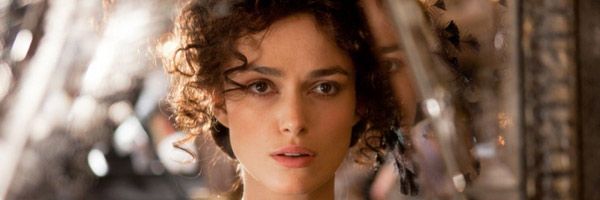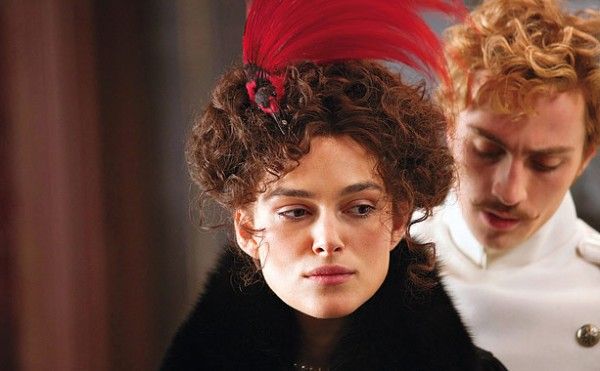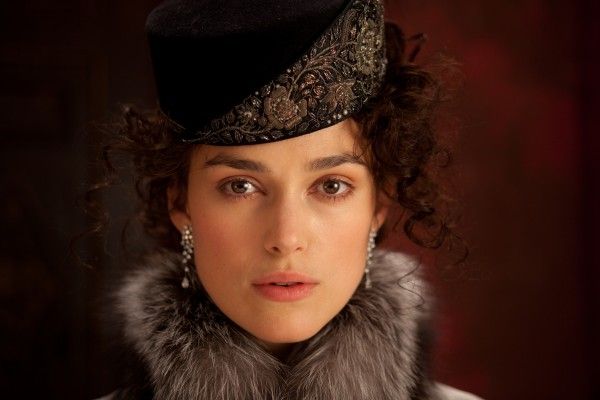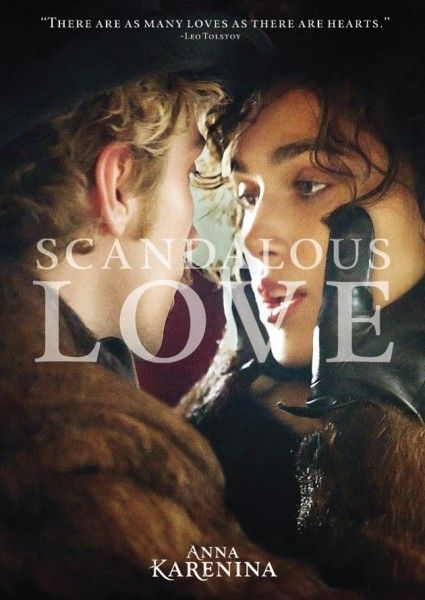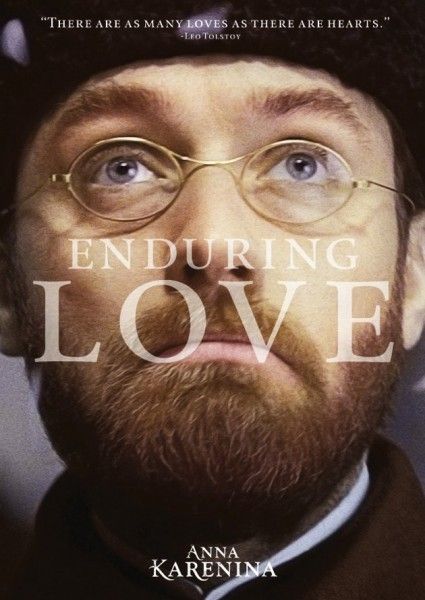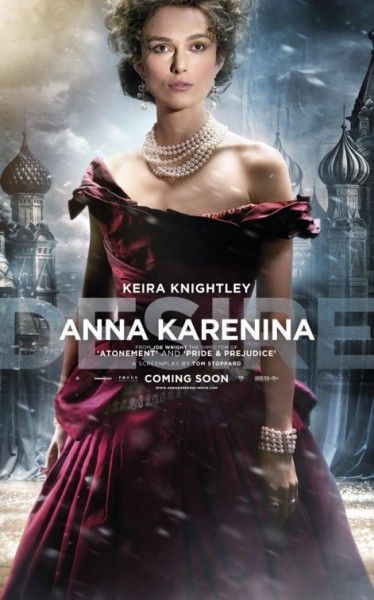Keira Knightley plays the title character in Anna Karenina, director Joe Wright’s bold, new romantic drama adaptation of the epic Tolstoy story of forbidden love set in 1874 Imperial Russia. The film, which opens in theaters on November 16th, marks the acclaimed director’s third collaboration with the Academy Award-nominated actress and also stars Jude Law and Aaron Taylor-Johnson.
At the film’s Los Angeles press day, Knightley talked about what drew her to the project, what about Wright’s vision made it stand out for her, why she saw Anna Karenina as a terrifying character, how she worked with the other actresses to create the impressive on-screen chemistry for the film’s female relationships, how her costumes played a pivotal role in telling her character’s story, why her film choices are all about story rather than where or when it’s set, and how she likes period, sci-fi and fantasy films as a dramatic tool. She also explained why she decided to move away from darker period pieces and do more contemporary films that are pure entertainment including the recently completed music drama, Can a Song Save Your Life?, and the large scale Tom Clancy thriller, Jack Ryan, directed by Kenneth Branagh, in which she stars opposite Chris Pine. Hit the jump to read the full interview.
Question: Thank you for giving us a Best Actress contender for the Oscars this year.
Keira Knightley: Oh, wow! Oh thank you! I’ll take that compliment. Thanks very much.
This is, I think, one of your finest performances. Anna Karenina has been done so many times on stage and screen. What attracted you to this and what about Joe’s vision made it stand out for you?
Knightley: I first read the book when I was about 19. Obviously, anyone would go, “Gosh, that’s an amazing character.” Joe and I had had a conversation when we were doing Atonement about great female roles and how few there are, and we were trying to name them, and Anna Karenina definitely came up within that conversation. He phoned me about two years ago, when I was working on A Dangerous Method, and he just went, “Anna Karenina?,” and I went, “Yup.” And he went, “Okay, we’ll only do it if Tom Stoppard does the adaptation,” and I went, “Okay,” and he said, “Okay, I’ll phone you back.” Two months later, he was like, “Okay, Tom’s doing it,” and I was like, “Great!” So that was it. The script obviously wasn’t there yet. It was purely on the potential of what that story and that character and that collaboration could be. When the script was first written and when we first started talking about it, it was going to be a completely naturalistic telling. It didn’t turn into this stylized thing until ten weeks before we started shooting when he phoned me up and said, “I’ve got something to tell you.”
I went into his office and it was this kind of madman’s lair of these weird drawings and storyboards everywhere, and he said, “Right. We’re going to set it in a theater.” If I’d been working with somebody that I didn’t know, that would have been totally terrifying and the alarm bells would have been ringing. Because I do know him and we’ve worked together so many times, there is an implicit trust there. The reason I wanted to work with him at all on this was because he was never going to do something just straight. Even when you look at Pride and Prejudice, he sent it off in a kind of [tangent]. It was deeply naturalistic in that everybody was scruffy and the hemlines were a bit off and there was mud over everything. It was a very different telling, and Atonement was the same thing. It was an infamously unfilmable novel and the fact is that he tackled that. So I always knew it was going to be something else that he’d bring out of it. I didn’t quite expect it was going to be that.
It was so magnificent it made me go back and read the book again.
Knightley: Oh really? Wow. Great. That’s good.
Is there something that you wanted to do with the character that wasn’t necessarily in the pages of the book? Were there notions that you developed, like this is going to be my stamp on her?
Knightley: No. I mean, within the pages of the book, it’s so massively open to different interpretations anyway, and partly because he does write from inside her head, but often he doesn’t. Often he writes from outside, judging her and describing her. Because of that judgment and that description, it means that there are lots of different interpretations. When I first read it when I was 19, I only remember her being innocent. I don’t remember judging her at all. I don’t remember seeing her as being in any way guilty. I read it again last year before we started shooting, when I see this at 26 because I was, and I suddenly see this differently. I see her as being much darker. I think her moral culpability is constantly in question. She is held up to be condemned at certain points. She’s also held up to be loved and to be understood and to be sympathized with. The relationship with her is quite a complex one for the reader, and because of that, it’s open to a lot of different interpretations. I didn’t go necessarily out of the book in trying to go how am I going to play this role. I tried to understand as far as I thought what her function within the book was, and therefore, what her function could be in the film fashion. I thought that kind of moral ambiguity was a really interesting one to play around with.
What parts of Anna’s life could you relate to and what parts were far away from yourself?
Knightley: I think she’s a terrifying character, and she’s terrifying because you do judge her, and you try and throw stones at her, and then you go, “Am I any better than her?” and the answer for everybody is “No.” It’s because you go, “Are we all occasionally deceitful?” “Yes.” “Are we all occasionally manipulative?” “Yes.” “Do we all hurt the people whom we love the most?” They are the people that we hurt the most. None of us are better than her. None of us have a right to judge her, and yet we do, and that’s terrifying. When I talk about the kind of complex relationship that you have with that character, I think that’s because of it. It really makes you go, “I am no better than this person that I am judging.” It’s quite a terrifying mirror that it holds up to human beings in general. So, as far as the love goes within her, I think it’s completely understandable. You have a woman that’s been married since she was 18. She gets to 28. She’s never had an orgasm. She’s never experienced romance. Of course, she suddenly feels lust for the first time. She suddenly has a taste of romance for the first time, and she equates that with love, and only that with love. She doesn’t see that there are many different forms of love and that that is a honeymoon period that will change into something else, and that’s her great tragedy. As soon as that bit, that little honeymoon period bit starts to change, she thinks the love has disappeared, and therefore, that he is cheating on her, and therefore, that the whole relationship is doomed and that she’s been left alone, and actually, it’s different. It’s that she just doesn’t understand what’s going on. I think that’s understandable. We all know serial romantics. Probably we’ve been there at certain points. As grown-ups, we also all know that that bit is not what a whole relationship is, but it’s completely understandable that you’d feel that it was. So I guess all of me and none of me is the same as her.
As strong as the male dynamics are with Anna in the film, it’s the female relationships – Dolly, Kitty, Betsy – that are part of the unsung beauty of the film because each looks like one slice of Anna and we get to see each part going against the whole. How did you work with the other actresses in establishing your on-screen chemistry?
Knightley: Nobody else has picked up on that. I think the one with Kitty, she ends up despising her because of the purity and because of the possibility, and because she was that and she could have been that and she wasn’t given the opportunities. There’s a part in the book I’m sure you’ll remember which isn’t in the film, but I thought was a massive part of the character. It’s the first and only time she actually meets Levin. She thinks, “This is Kitty’s husband, and I hate Kitty because Kitty detests me, and I’m going to make that man fall in love with me,” and she does. You think that’s a fucking terrifying thing for her to do. That’s a fucked up thing for somebody to do, and so you have to look at that as being part of the character. Within how we worked together, they’re wonderful girls. I mean, Kelly Macdonald is one of my favorite actresses of all time and her performances are just divine, and so, working with her was just a total dream come true. I’d watch anything that she does. I think she’s sensational. The same goes for Ruth Wilson who’s a phenomenal actress, and that’s fun because it’s a very bitchy relationship that everybody I think has had – men and women -- these strange friendships that are competitive and odd and it’s fun doing that. But the Kitty one we softened a lot, because it’s very difficult. If you put that scene in, you never get sympathy for Anna back. In film, it would be really difficult, and so, we did play. There was an original screen version between Kitty and her in the beginning where you see her look at Kitty and see the younger woman and detest her for being the younger woman. We did actually all go, “I think we can’t quite take it that far.” But that was definitely underneath everything.
Anna Karenina has been adapted before and I imagine that you’ve seen some of those?
Knightley: It’s been done 25 times actually. On film, I think it’s been done 12 times. But I think if you’re counting the Russian versions, it’s something more like 25. (laughs) So there you go.
Did you feel the need to gravitate away from those performances? Were you ever thoughtfully distancing yourself from the things that they had done?
Knightley: I actively decided not to watch any more of them. I’d seen two of them. I’d seen the Greta Garbo version, and I’d seen Helen McCrory, who is a wonderful English actress who had done a version in 2001 on the BBC. They had not been pieces of work that I’d gone back to again and again. I’d only seen them once when I was a teenager, and I didn’t have a huge memory of what those performances were. I decided not to go back and watch any more, because I thought you make a decision that another actress has made based on the book, then that’s fine, but it’s an accident. It’s not that you’re going, “Oh yeah, I’m going to nick that from her performance,” because that’s not fun.
What is it about working with Joe? Is it the scary things he throws you into?
Knightley: Yes, slightly. I think so. He is totally obsessed by what he does. I mean, it’s an obsession. He gives 150% of himself. It’s 24/7. He makes it feel like it’s the most important thing in the world. Obviously, it isn’t. But to work with somebody that requires 150% from everybody, that requires total immersion within the piece of work, is an incredibly intoxicating thing to be around. Also, you always know that even if we get it wrong, we will have given it a bloody good try. We will have given it everything. I think actually people within creative worlds, that’s all they want. You want it to be that important and he does that. I think equally, because it’s not just me who is working with him again on this, it’s his costume designer, his set designer, his lighting designer, his composer. I’m sure I’ve left somebody out, but there’s a whole group of those. It’s a team that has come back together and there’s a massive amount of respect. Everybody respects everybody else’s talent and space, and there’s a massive amount of trust. So I guess it’s that.
My favorite line from the film is when Anna is on the train and says “I’d rather end up wishing I hadn’t than end up wishing I had.” Do you feel like that in your life?
Knightley: So, live with no regrets?
I think that’s what set Anna off and she decided to just go for this guy.
Knightley: Yes, I think that is definitely why it’s there. I don’t know if it’s always possible. I mean, yeah, it’s a great sentiment, but I don’t know that it’s always possible and should be possible. Yeah, it’s a good sentiment.
The costumes were magnificent and I’m curious for you how much of you loves all the costuming and all that attention to detail and is there a part of you that is “Ugh, another layer”?
Knightley: It adds two hours to the day, so you’re shooting a 12-hour day and suddenly you do have to come in two hours before for hair, make-up, and costume, and it takes an hour to get out of it. So you’re adding three hours to a 12-hour day, which is just mandatory if you’re doing period pieces or fantasy pieces. I know that if it’s a massive prosthetic job, it’s the same thing. So there is that added thing, and you do get to the end of a job like this and go, “I really don’t want to do a period film for a while because I’m fucking exhausted.” But there’s a whole process, and particularly with Jacqueline (Durran) who did the costumes for this, the process of building that character from the ground up. Every one of those costumes had an amazing amount of symbolism within it. They were all totally part of telling that story. She was a caged bird, so that idea of the symbol of the cage being that and the cage underneath the dress that you see at the end, and then the veils, the idea of keeping death close to her at all times, so she’s wrapped in fur. She’s got dead birds in her hair.
The jewelry is the hardest of all stones that could slit her throat at any moment. Keeping sex there all the time so you’ve got these dresses that look like they’ve got lingerie coming through or falling off, and one of the dresses was actually made of bed linen because we wanted to keep that post-coital kind of thing there the whole time. And then, there’s the dress that she dies in. I got completely obsessed with the idea of the Whore of Babylon and the fall of the Whore of Babylon, so we found so many different paintings of that that we tried to find that color for that dress. That’s why I love working within fantasies, not just period dramas. I haven’t done any sci-fi. I should imagine you could do the same thing with that. As soon as you’re taking clothes out of being what we do every day, which is we chuck them on and don’t think about them, you start going how can you use this medium to tell this story as well. I find that very exciting.
Was there anything that you just loved to wear?
Knightley: Fuck no. I mean, hey, I would have liked to keep the diamonds. That would have been quite fun, but I didn’t get to keep them.
Will you be going away from period pieces with your next projects?
Knightley: I’ve just done two contemporary pieces, but no, it’s all about story. It’s not about when it’s set or where it’s set. I like period. I like fantasy as a dramatic tool. I think it’s a really great dramatic tool, because it means that you leave yourself behind. Your imagination is required instantly in a period film, because it’s a world that you don’t know, with rules you don’t know. I certainly relate to characters on an emotional level very differently in period pieces or sci-fi pieces or fantasy pieces than I do in pieces that are more voyeuristic and present us with the world that we know. I think that’s a very different relationship with the story. So that’s why I enjoy doing period things. It’s that tool that I really enjoy.
Can you talk about working on Jack Ryan and how that’s going?
Knightley: Yes, Jack Ryan. I got to the end of Anna Karenina and realized that I’d been doing pieces of work that were incredibly dark, and I pretty much died in a lot of them for five years. I wanted this year to be the year of positivity and pure entertainment. So, I did one film called Can a Song Save Your Life? which is about friendship and making an album and possibilities. And, Jack Ryan is a really great, old school, Hollywood thriller and a piece of pure entertainment, and hopefully it will be that.
Are you still filming?
Knightley: I’m currently shooting it in London. I’m nearly at the end of it. I think we finish early December.

